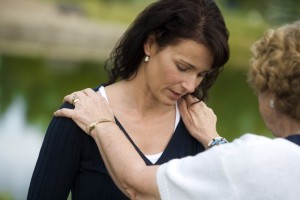- Calls to this hotline are currently being directed to Within Health, Fay or Eating Disorder Solutions
- Representatives are standing by 24/7 to help answer your questions
- All calls are confidential and HIPAA compliant
- There is no obligation or cost to call
- Eating Disorder Hope does not receive any commissions or fees dependent upon which provider you select
- Additional treatment providers are located on our directory or samhsa.gov
Who Am I Without Anorexia? Finding Purpose, Meaning, and Your True Self in Recovery – Part 11

Decision Making & The “True Self” in Eating Disorder Recovery
When we have this renewed sense of self and become anchored in the values that we have identified through self-exploration, it becomes easier to make decisions.
One of the things I have heard a lot about over the years in working with people struggling with eating disorders is the difficulty in making decisions. This can be particularly difficult for individuals that have been starving themselves for prolonged periods of time because of the inability to think clearly.
Similar to a type of therapy called Acceptance and Commitment Therapy, we must learn to accept that things sometimes happen that we cannot control, we commit to taking a valued action.
Imagine, a person that has developed their entire sense of self around anorexia. Often, they won’t know what their values are at all because they have likely been driven by other, potentially abusive, people or situations. It would be challenging for this person to make a decision or a choice for themselves.
As such, in the later stages of recovery, our hope here at Rebecca’s House is to help people prepare themselves to know who they are, know what their values are, and approach the world with a renewed sense of self that is prepared to make those decisions on what is best for them.
Being in that pure awareness is tough. Often, stillness can be uncomfortable for people. In our society today, we are constantly stimulated, and it is becoming increasingly difficult just to sit down and be still or be present without using a phone or watching the television.
It is crucial that someone in treatment be able to be bored, to not be okay, and to just let things be as they are in the moment. This can really help in times of having urges to go back to the eating disorder.
When you learn to be still, be okay with not being okay, and observing your thoughts without necessarily taking action on them, it is much easier to understand your thoughts, where they are coming from, set them down, and move on.
It also helps you to be able to anticipate these events, situations, or people that may be upsetting.
 Finally, I want to acknowledge the extreme difficulty involved in helping someone struggling with an eating disorder to form a true sense of self.
Finally, I want to acknowledge the extreme difficulty involved in helping someone struggling with an eating disorder to form a true sense of self.
Depending on the severity of the disorder, in the beginning stages of treatment, this is nearly impossible to do. This is why allowing the adequate amount of time to pass is key. Make sure clients are stabilized before doing this difficult work.
If you are working with someone with anorexia, for example, and you start making demands on their progress in terms of understanding a higher sense of self before they have even restored their weight to a point where they can think clearly, you are setting them up for failure. This can be devastating so make sure that your pacing is taking this into account.
Additionally, maintain proper boundaries yourself, and make sure others that interact with the individual do the same. Creating “the line” can be calming for a lot of people. It often puts their minds at ease because it is not a question mark.
There are a lot of ways to explore the “self.” We are all more than a body or, what I like to call my “Earth suit.” It gets me from point A to point B, and I am very grateful to have it. I want to take care of it like I would a vehicle, but it is not at all what I am.
I hope that you are all able to recognize this and to have peace in the knowledge that you have so much more to offer the world than your body.
Allow yourself the time and space to explore who you truly are beyond the skin you are in.
Please See
Who Am I Without Anorexia? Finding Purpose, Meaning, and Your True Self in Recovery – Part 1
Who Am I Without Anorexia? Finding Purpose, Meaning, and Your True Self in Recovery – Part 2
Who Am I Without Anorexia? Finding Purpose, Meaning, and Your True Self in Recovery – Part 3
Who Am I Without Anorexia? Finding Purpose, Meaning, and Your True Self in Recovery – Part 4
Who Am I Without Anorexia? Finding Purpose, Meaning, and Your True Self in Recovery – Part 5
Who Am I Without Anorexia? Finding Purpose, Meaning, and Your True Self in Recovery – Part 6
Who Am I Without Anorexia? Finding Purpose, Meaning, and Your True Self in Recovery – Part 7
Who Am I Without Anorexia? Finding Purpose, Meaning, and Your True Self in Recovery – Part 8
Who Am I Without Anorexia? Finding Purpose, Meaning, and Your True Self in Recovery – Part 9
Who Am I Without Anorexia? Finding Purpose, Meaning, and Your True Self in Recovery – Part 10
Source:
Virtual Presentation by Nicole Karst in the May 17, 2018, Eating Disorder Hope Online Conference II: Anorexia Hope & Healing in 2018.
Please view the press release Here.
Author: Nicole Karst, MA LVN – Lead Therapist at Rebecca’s House Eating Disorder Treatment Programs
– Lead Therapist at Rebecca’s House Eating Disorder Treatment Programs
Nicole Karst has 17 years of combined experience in the health and mental health fields. After completing her service in the military as a Fleet Marine Force Corpsman, she started a career in nursing. It was through her nursing experience that she began working with those diagnosed with eating disorders, substance use disorders, psychotic disorders, and mood disorders. This experience inspired Nicole to return to school, and she is graduating this spring with a doctoral degree in Clinical Forensic Psychology.
Nicole’s experience includes individual and group therapy, psychodiagnostic assessments, mindfulness meditation, and medical assessing/monitoring of complications related to eating disorders. She joined the leadership team at Rebecca’s House Eating Disorder Treatment Program from Casa Palmera.
Nicole combines a psychodynamic case conceptualization with cognitive behavioral interventions, guided imagery, logotherapy and somatic awareness in her treatment approach. She works with those she serves to cultivate their ability to eat intuitively, exercise mindfully, engage life with purpose and meaning, and discover who they are in the absence of maladaptive behavior.
 About the Transcript Editor: Margot Rittenhouse is a therapist who is passionate about providing mental health support to all in need and has worked with clients with substance abuse issues, eating disorders, domestic violence victims, and offenders, and severely mentally ill youth.
About the Transcript Editor: Margot Rittenhouse is a therapist who is passionate about providing mental health support to all in need and has worked with clients with substance abuse issues, eating disorders, domestic violence victims, and offenders, and severely mentally ill youth.
As a freelance writer for Eating Disorder and Addiction Hope and a mentor with MentorConnect, Margot is a passionate eating disorder advocate, committed to de-stigmatizing these illnesses while showing support for those struggling through mentoring, writing, and volunteering. Margot has a Master’s of Science in Clinical Mental Health Counseling from Johns Hopkins University.
The opinions and views of our guest contributors are shared to provide a broad perspective of eating disorders. These are not necessarily the views of Eating Disorder Hope, but an effort to offer a discussion of various issues by different concerned individuals.
We at Eating Disorder Hope understand that eating disorders result from a combination of environmental and genetic factors. If you or a loved one are suffering from an eating disorder, please know that there is hope for you, and seek immediate professional help.
Published on July 30, 2018.
Reviewed & Approved on July 30, 2018, by Jacquelyn Ekern MS, LPC
Published on EatingDisorderHope.com

The EatingDisorderHope.com editorial team comprises experienced writers, editors, and medical reviewers specializing in eating disorders, treatment, and mental and behavioral health.

